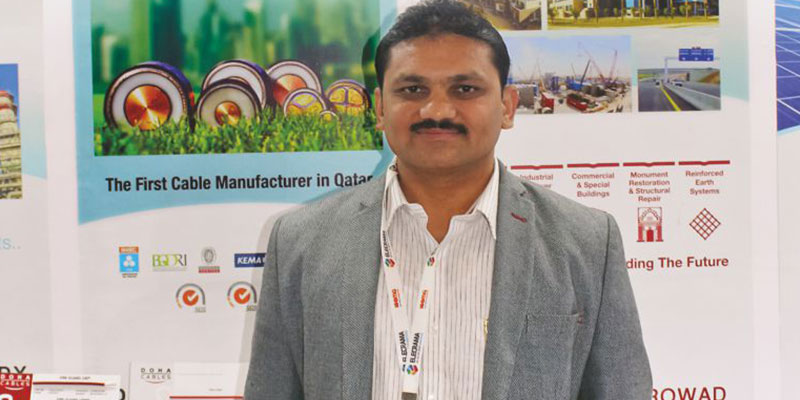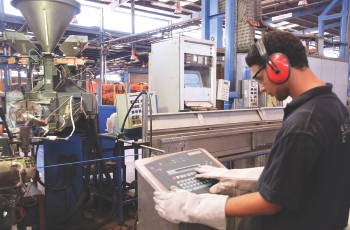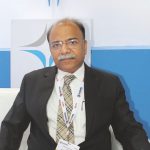Doha Cables, a part of Egypt-based Elsewedy Electric, has multipronged strategy to enter the Indian wire and cable market, starting with marketing its enormous range of electrical products and solutions to eventually setting up a manufacturing facility here in India. The company is quite bullish about its product range and quality to soon make its presence felt in the Indian market.

“As a group and as per our Chairman’s direction, wherever we go, we must try to set up big operations. This is how we have established 25 production facilities across 15 different countries. Our goal has always been to install large capacities in regions we usually target for our business. Likewise, we have a huge investment plans for India too. To start with, we may go for a cable manufacturing setup as cables are our core product,” said Mr. Ritesh Doshi, Sales Director, Elsewedy Cables in a recent interview with Wire & Cable India.
Wire & Cable India: Please brief us about Doha Cables.
Ritesh Doshi: Doha Cables is a part of Elsewedy Electric, which is originally from Egypt. We established our plant in Qatar in the year 2009; the very first cable manufacturer in Qatar. Since then, we are producing low voltage, medium voltage, high voltage, and extra high voltage types of cables. We have also developed cables like fire resistant cables, cables for specialized applications, building wires, and many other products. As a diversified organization, we don’t just supply cables but undertake cabling projects as well. So, in and around the cable, we can offer a complete solution on behalf of our company.
We as a group are 40-years-old now and have a total of 25 production facilities worldwide. One of them is a cables manufacturing facility in Qatar in the name of Doha Cables. Everywhere else, we are using the brand name of our parent company, i.e. Elsewedy Electric. Over time, we have diversified from cables to a range of electrical goods and services. We are operating in five diversified energy segments: Cables & Accessories, Electrical Products, Energy Measurement & Management (Meters), Transformers & Projects (Power Generation, Power Transmission & Distribution, Construction & Infrastructure, Projects Development & Renewable Energy, Telecom Solutions and Industrial Development).
We are an approximately USD 5 billion group and in Doha Cables itself, we are doing around USD 500 million of business. We are exporting to almost 40 countries worldwide and we are now very much interested in entering the Indian market particularly as a competitor to other cable companies in the region.
WCI: Talking about your interest in India, what kind of plans Doha Cables have for the next 2-3 years for the Indian market.
 RD: By looking at the way India is growing, we are very much attracted to the market. As for plans for the Indian market, we won’t be restricting ourselves to a single strategy. Whatever is required for us to grow in India, we are ready to try. We are not looking up for any technical tie-ups as Doha Cables is part highly competent group in areas of technology with ample experience in the cabling solutions. We however are looking for very strong partners and associates, and obviously the distributors, who could represent us in the Indian market.
RD: By looking at the way India is growing, we are very much attracted to the market. As for plans for the Indian market, we won’t be restricting ourselves to a single strategy. Whatever is required for us to grow in India, we are ready to try. We are not looking up for any technical tie-ups as Doha Cables is part highly competent group in areas of technology with ample experience in the cabling solutions. We however are looking for very strong partners and associates, and obviously the distributors, who could represent us in the Indian market.
We would like to enter the Indian market directly to add more value to its current growth. I am sure we would be able to do so. This in turn will help us grow as well. As a group and as per our Chairman’s direction, wherever we go, we must try to set up big operations. Our goal has always been to install large capacities in regions we usually target for our business. Likewise, we have a huge investment plans for India too. To start with, we may go for a cable manufacturing setup as cables are our core product. We would also like to execute certain turnkey projects around our expertise such cabling solutions, substations, independent power projects along with projects in renewable energy.
WCI: What are the challenges you think you might face while entering the Indian market?
RD: Of course, India is a very competitive market and the competition for us in the coming years will be huge. But I am sure the expertise of almost 40 years will help us establish our brand well in India. Besides, there isn’t just a single product that we are going to offer; instead, we will be offering a complete end-to-end solution to the power sector, where players offering such complete solution are not many. This is where we can have an advantage over others and add some value to the Indian wire and cable industry. However, even if I see the positive side and say India can give a plethora of opportunities, the market undeniably remains a big challenge for us as of now.
WCI: Is there any strategy you have chalked out to fight over the challenges you mentioned?
RD: First of all, we are not only going to just represent Doha Cables. We will be coming as a whole group with our extensive range of products and solutions. As far as the market strategy is concerned, we would like to go ahead in the market with the cables which we are already producing in our parent company factories. We would like to proceed with the range of high voltage cable where the competition is relatively less. Once we are through and know the market a little bit more, we would like to go to the next step, which is setting up the manufacturing plant. We may either set up a Greenfield project or go for a Brownfield project by taking over some already existing plants. We will do adequate study and analysis and then decide which one is better for us.
WCI: Where do you think the USP of Doha Cables lies in order to become successful in the Indian market, where few foreign companies have earlier ventured and failed to register a presence?
RD: The basic advantage with our company is that we are actually coming from the Asian market, where we have rich experience. Our cultural contiguity facilitates the business dealings, and all Asian markets represent a single unified business culture. In India, we don’t feel we are entering into some new place. It is already known to us. Also, we are very competitive, not only in terms of price, but also in quality, range, efficiency, delivery, product range, and so on. Moreover, we have rich financial backup. With all these strengths, I am sure we will be very much successful.
We are aggressive too. We have acquired a lot of international certifications. This proves we are quality suppliers and that is what India is currently looking for. There is a whole new shift in the lifestyle of the Indian people and now they are looking more towards the quality. If quality comes with a competitive price and overall competitiveness, then definitely we will look for it.
WCI: Tell us more about the product basket, which you are going to market in India.
RD: As I told you, I don’t want to restrict to any one segment. We have an entire product range to offer. Wherever we get an opportunity, we will enter. The product range which we have is quite versatile. We have a really good product which is called smart meters. The Indian market is not new to us. We have a bit of experience and with that it would be very easy for us to establish in India. It’s not like we would only like to enter for cable or meter or transformer for that matter. We would like to serve the Indian market in our best capacity possible. We are even looking at some investment in independent power projects. And, I can see the immense potential in the Indian energy sector today and in future to come. Apart from this, it is not mandatory that we represent the products which we have. To grow, we are also flexible in developing the products which are suitable for the Indian market, diversifying further if required in India.
WCI: What are your views regarding the Indian wire and cable industry?
RD: A few years back, the Indian market, particularly the wires and cables, have passed through very bad times. But from the last two to three years, I can see it has come up very well and most of the cable producers are very busy. I can see that the cable and wire industry is really booming and would be on the right track in years to come.






